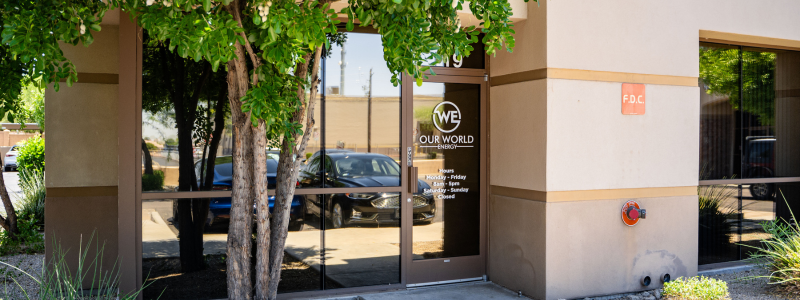The future of solar panels promises an immense potential for leading sustainable energy. Advancements in technology, paired with a global environmental focus, give solar panels a powerful advantage.
The solar industry revolutionizes how our community generates and consumes electricity. In this blog, we will discuss:
- Will solar energy have other uses in the future?
- Is solar energy worth it in the future?
- How long does it take for solar panels to pay for themselves?
- Will solar ever get cheaper?
- Is going solar better than electric?
- Is solar now cheaper than gas?
Will Solar Energy Have Other Uses In The Future?

In addition to powering homes and businesses, solar energy could power 14% of transportation by 2050. Classic photovoltaic (PV) panels pair well with electric vehicle (EV) charging- and have the power to charge both cars and parking canopies. Other uses include:
- Disaster response. Concentrated solar power can be used as backup energy if an emergency affects the power grid. Communities can then better recover after disasters.
- Agriculture. Solar energy can power irrigation systems, greenhouses, and farms in remote areas.
- Architecture. Outside of classic panels, both solar windows and roof tiles can be built into structures for more produced solar opportunities.
- Space exploration. Solar power can produce energy for long missions or large spacecraft.
Solar has many electricity-generating uses as technology advances!
Is Solar Energy Worth It In The Future?
Not only is solar energy a great current investment, but it’s also an investment that can benefit you for many years to come. With factors such as energy independence, utility cost reduction, long-term savings, technological advancements, and government incentives, solar energy takes a rewarding approach to sustainable energy. Additionally, solar power is more environmentally friendly than fossil fuels- which helps keep our planet healthier for longer.
How Long Does It Take For Solar Panels To Pay For Themselves?

Homeowners will see solar panel payback in approximately 6-10 years. Results may vary, as many solar factors can influence the payoff range. Large solar panels have a heftier installation cost and a higher savings rate. Generating more energy will cost-effectively save money in the long run. Consult a professional for an accurate calculation of your solar payoff rate.
Will Solar Ever Get Cheaper?
As solar energy rises in popularity across the United States, there are recorded price drops. There was an 80% price decline between 2000 to 2020, and there is an expected 34% decrease by 2030. As the future of solar becomes a competitive clean energy force, further innovation in the industry will lead to cost reductions. Demand will continue to rise so that more competitors will make solar panels. Falling costs can also come from:
- Technology advancements.
- Manufacturing efficiency.
- Supportive government policies.
- Growing economies.
Solar technologies will become a more affordable option for homeowners. But don’t wait for prices to drop. The good news is that even with the price of installation, the costs of solar still outweigh traditional utilities.
Is Going Solar Better Than Electric?
Solar energy can be better than electric energy based on your household’s needs. Compared to traditional electricity, solar power provides benefits such as:
- Less greenhouse gas emissions.
- Reliable backup power.
- Eligibility for tax breaks or cash incentives.
- Increased home value.
- Low utility rates.
Solar power has become more reliable and accessible, providing a better ROI and long-term benefits. With time, the overall solar panel installation costs are outweighed by the money saved. As one of the fastest-growing sources of renewable energy, solar panels can provide significant savings on utility bills for up to 25-30 years.
Is Solar Now Cheaper Than Gas?
Green energy is reportedly cheaper than fossil fuels. Energy Intelligence describes that solar energy is more affordable than coal, gas, and oil. Renewable energy can cost approximately $60 per megawatt-hour (MWh), while traditional fuel costs around $80 per MWh. Photovoltaics can also operate longer and accurately match energy demands with supply.
Redefine Your Future With Our World Energy

Solar panels offer an eco-friendly and cost-effective solution for generating electricity- and our team is here to create a new solar-powered generation.
With professional consultation, transparent partnership, and expert installation, let Our World Energy get you started on your journey to energy independence.
Fill out our form or call us today at 844-514-1639.



